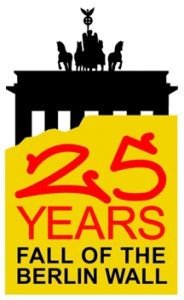 For the third time, the German Program at UNCG participated in German Campus Weeks. The theme marked the 25th anniversary of the fall of the Berlin Wall. To commemorate this monumental historical event, the German Program hosted a film screening and a symposium titled “Looking Back, Moving Forward.” Thanks to a grant from the German Embassy, the symposium included a variety of events. Scholars from across the UNCG campus as well as from institutions near and far shared their research on the historical, political, economic, and cultural ramifications of Germany’s divided past and the fall of the Berlin Wall and its continued meaning today in a globalized world.
For the third time, the German Program at UNCG participated in German Campus Weeks. The theme marked the 25th anniversary of the fall of the Berlin Wall. To commemorate this monumental historical event, the German Program hosted a film screening and a symposium titled “Looking Back, Moving Forward.” Thanks to a grant from the German Embassy, the symposium included a variety of events. Scholars from across the UNCG campus as well as from institutions near and far shared their research on the historical, political, economic, and cultural ramifications of Germany’s divided past and the fall of the Berlin Wall and its continued meaning today in a globalized world.
The symposium took place on November 7, 2014 and kicked off with a presentation by UNCG art professor Sheryl Oring live via videoconferencing from her current art exhibition on the fall of the Berlin Wall in The Kennedys Museum in Berlin. Professor Oring presented on her project on the Berlin Wall, titled “Maueramt,” which entailed a performance art component for which she set up an “office” at locations in Berlin along the former wall in the fall of 2014 and asked passers-by questions such as: “What do you think about when you think about the Berlin Wall,” or “What would you like the world to remember about the Berlin Wall?”. Using a manual typewriter, she typed the responses onto small sheets of paper, which were then put on exhibit in The Kennedys Museum.
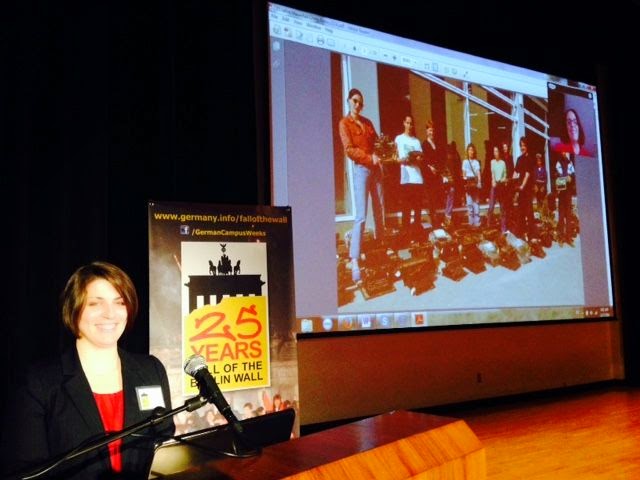
Professor Sheryl Oring (top right of screen) tells about her art project “Maueramt” live from her
exhibit in The Kennedys Museum in Berlin while Dr. Brooke Kreitinger assists with the presentation at UNCG.
“History in the Making:
Eyewitnesses Share Their Memories”
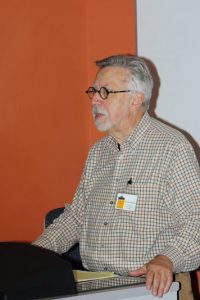
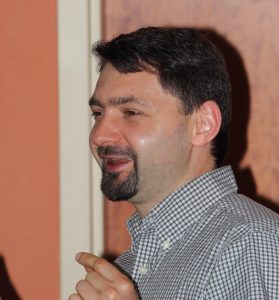
Dr. Karl Schleunes Dr. Vasyl Taras
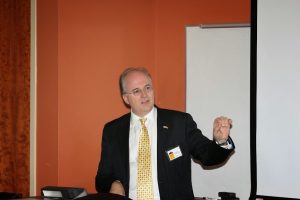
Mr. Reinhard von Hennigs
The second afternoon panel explored the continuing effects of the fall of the Wall on a global scale from multiple academic perspectives. In his talk “Legacies of the Berlin Wall: Our Persistently Territorial World,” Dr. Corey Johnson, Associate Professor of Geography at UNCG, contemplated the significance of the fall of the Berlin wall and the contemporary notion of a “borderless” globalized world by referencing the border issues related to the large number of walls and fences that have been erected over the past twenty-five years, for instance between the U.S. and Mexico, around Jerusalem, and in northern Africa separating the Spanish enclaves of Melilla and Ceuta from Morocco. Dr. Johnson concluded that 1989 was not an isolated moment, but rather we are just as territory-bound now in 2014. Dr. Jerry Pubantz, Dean of the Lloyd International Honors College and Professor of Political Science at UNCG, investigated the fall of the Berlin Wall in relation to the significant historical anniversaries that occurred in 2014. Dr. Pubantz emphasized that these include not only the 25th anniversary of the fall of the Berlin Wall, the 100th anniversary of the start of World War I, and the 75th anniversary of the start of World War II but also the end of the Russo-Turkish War in 1774, at which point the Russian Empire gained control of Crimea, and the end of the War of Spanish Succession in 1714. Rejecting Fukuyama’s much cited claim, Dr. Pubantz argued that history did not end with the collapse of communism; rather, it has been resurrected with the resurgence of ethnic nationalities, which he asserted is exemplified in Russia’s recent takeover of Crimea. Dr. Pubantz further argued that Russia today echoes the weak and receding Ottoman Empire of 1774 which lost Crimea to Catherine the Great and signifies the latest chapter in the collapse of empire. The final panelist, Dr. Helga Welsh, is Professor in the Department of Politics and International Affairs at Wake Forest University. Dr. Welsh’s talk “After the Wall: From Division to Unity” addressed why the collapse of East Germany was a surprise at the time, the shift from euphoria to shock and uncertainty about the future, Kohl’s political approach of “no experiments”, and now 25 years later the differing narratives of assimilation and continuing disparity between the federal states that comprised former East Germany and former West Germany.
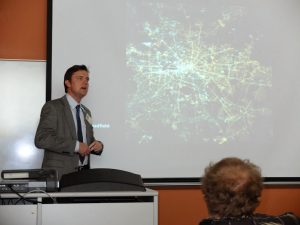
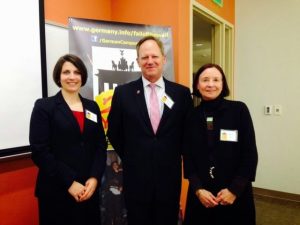
Dr. Corey Johnson (left pic); Panel moderator Dr. Brooke Kreitinger (right)
with panelists Dr. Jerry Pubantz and Dr. Helga Welsh
UNCG German students actively participated in the day’s events as well. Students wearing the colors of the German flag and holding posters of iconic photographs of the construction and fall of the wall created a human “Berlin Wall” and then symbolically performed its collapse. Students also constructed a “Trabi photo booth” to help create a fun and festive air to celebrating the anniversary of the fall of the wall.
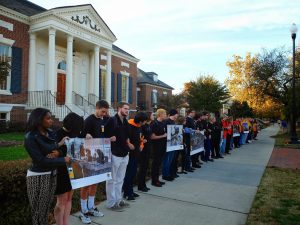
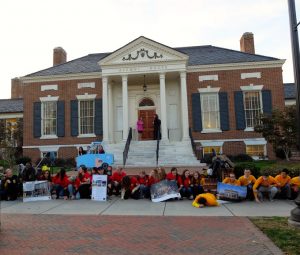
UNCG Students form a human “Berlin Wall” and symbolically perform its collapse.

Trabi Engineers
UNCG German students further engaged with the day’s topic by delivering speeches and presenting posters advocating for change. These projects were prepared in the spirit of the Montagsdemonstrationen, which were pivotal in bringing about East Germany’s peaceful revolution. These activities also functioned as our “Campus Competitions” for the Fall of the Wall Campus Weeks; hence, prizes were awarded to the top speeches and posters.
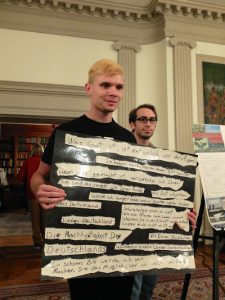
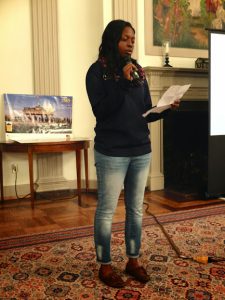
Students present posters and deliver speeches for the
Montagsdemonstrationen/Speaker’s Corner Competitions
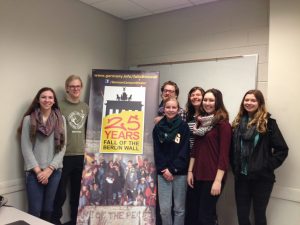
Winners of the Montagsdemonstrationen/Speaker’s Corner Campus Competition
The winners of the competitions are:
Daniel Foil for his speech “Freude, Mitbürger! Ein politischer Aufruf im Geiste der Montagsdemonstrationen.”
Juliet Furst and Ashley Grantham for their creative poster associating the division of United States during the Civil War to the division of Germany during the Cold War by means of superimposing onto the silhouette of divided Germany the biblical saying “A House Divided Cannot Stand,” which was employed by Abraham Lincoln during the American Civil War.
Alexandria Amodeo, Kanita Hasanbasic Herceg, and Kate Welker for their poster in the form of East and West Germany created out of a montage of images of the demands of protestors at the Monday Demonstrations in Leipzig in the fall of 1989.
Lauren Saunders and Therese Pircon for their colourful poster titled “Breaking down Barriers.”
Our keynote address was delivered by Dr. Jennifer Ruth Hosek, Associate Professor of German Studies at Queen’s University in Ontario, where she is also affiliated with Film and Media Studies, Cultural Studies, and the University of Havana-Queen’s exchange. Dr. Hosek publishes primarily on transnational cultural and film studies. Her recent book Sun, Sex, and Socialism: Cuba in the German Imaginary investigates overlooked influences on the post-Second World War Germanys’ understandings of national identity. Other recent publications investigate film to address issues of space and national identity in post-unification Germany, particularly Berlin.
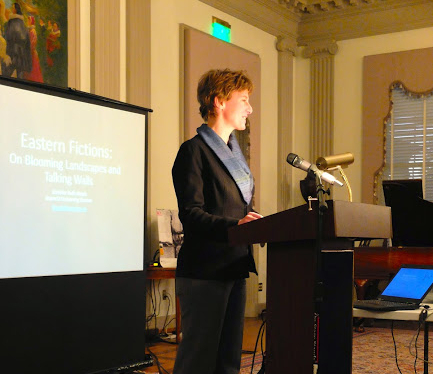
Dr. Jennifer Ruth Hosek delivers the keynote address
Dr. Hosek’s talk “Eastern Fictions: On Blooming Landscapes and Talking Walls” grappled with how art, especially film, shapes our understandings of unification and its aftermath. She argued that until recently, Wende films (films addressing the fall of the Wall and German unification) have been primarily humorous and employ two distinct forms of humor: critical or affirmative. She further argued that many Wende films of the 1990s made by East German filmmakers were satirical following in the style of DEFA films that developed their techniques under state censorship, and these films were largely unsuccessful. Hosek attributed this lack of success to insufficient access to funding and distribution, and because the films were politically thorny in that they problematize unification, reinscribe divisions between East and West Germans, and their message hampered unification by depicting the GDR as too problematic and unattractive to be worth bringing into the FRG fold. In contrast, Hosek further claimed, the initial embrace of affirmative humor in mainstream Wende films had to do with furthering broad-based acceptance of unification. On the example of Good Bye Lenin!, she illustrated the ways in which the two distinct types of humor were employed to impact viewers’ attitudes about unification and GDR ideals. She then used Das Leben der Anderen to show a shift from humorous films to a far more serious criticism of the GDR in more recent years.
The symposium concluded with a reception following the keynote address. Guests enjoyed refreshments, toasted the 25th anniversary of the fall of the Wall, and continued discussions sparked by the day’s events. Live musical accompaniment was provided by one of UNCG’s German and Music double majors, Mr. William Hueholt.
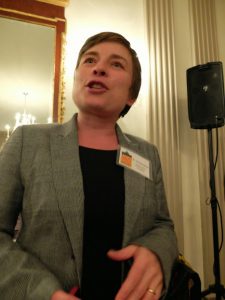
Dr. Susanne Rinner speaks to guests at the reception
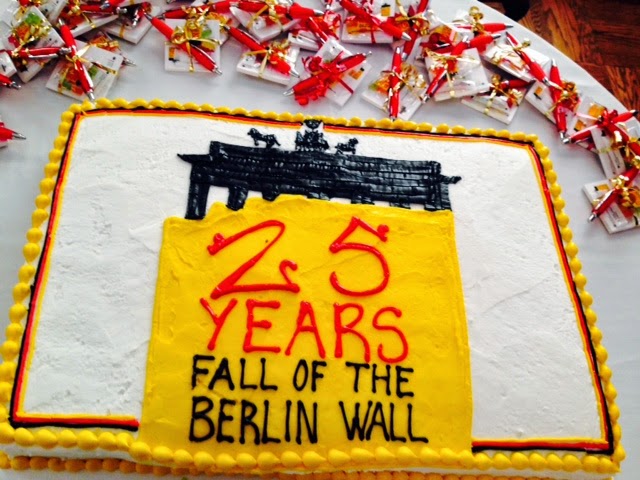
Commemorative cake at the symposium reception
A screening of the film Good Bye Lenin! offered a further opportunity to reflect on the historical significance of the fall of the Berlin Wall. The film was well received by the attendees and raised several questions concerning divided Germany and unification. A lively discussion ensued and exchange students from Germany, including one student who was born in the GDR in its last year of existence, and German Program faculty provided input and a variety of perspectives on the history of a divided Germany, the Cold War, and the collapse of the East German state.

UNCG Students and German Program faculty at the screening of Good Bye Lenin!, October 22, 2014